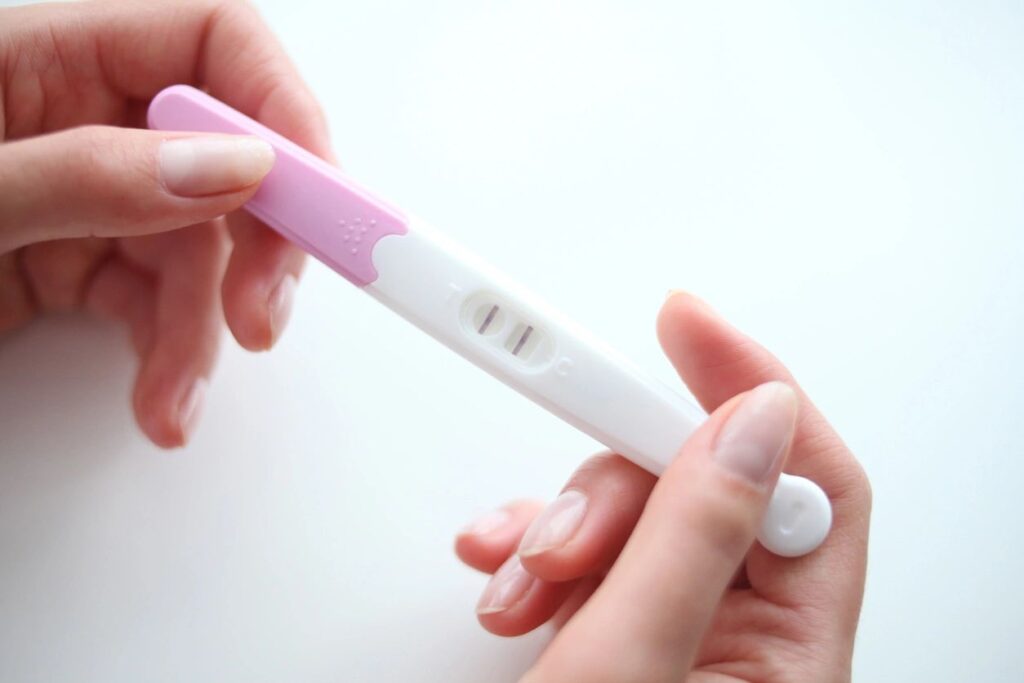
What is the best pregnancy test?

Taking a pregnancy test is stressful. Some women taking the test are praying that it’s positive and some are praying the pregnancy test is negative. Then there is another group of people who are not sure what they want the test to show. In my world as a fertility doctor all my patients were praying for a positive pregnancy test. One person even told me that they thought pregnancy tests were as addictive as crack. Whatever your situation it’s important to know how the pregnancy test works and what information they can tell us.
There are two major categories of pregnancy tests. There is the blood pregnancy test that a doctor orders and the home pregnancy test. The two types of tests differ slightly and give a little different information. They both rely on detecting the presence of hCG. hCG is a pregnancy hormone that is produced by the placenta.
Types of pregnancy tests
The blood pregnancy test typically tests for the presence of hCG and also gives a value for the concentration of hCG. This test helps determine if someone is pregnant and a physician can follow the hCGs levels to see if the pregnancy is most likely a normal pregnancy.
The home pregnancy test looks for the presence of hCG in the urine. This type of pregnancy test does not give a concentration of hCG. It is helpful to use and determine whether or not someone is pregnant but we cannot follow the levels to understand whether the pregnancy is progressing normally.
A common question is how to take a pregnancy test. Also people want to know the best pregnancy test. There is no best pregnancy test. The truth is that each pregnancy test is a little different. My recommendation is that you read the directions for the specific pregnancy test you have. The directions will tell you step-by-step how to take a pregnancy test. If you have questions about a specific pregnancy test brand or type please feel free to ask me in the ask the Doc section. I am happy to review the specific pregnancy test and give you my thoughts.
Positive pregnancy test
A positive pregnancy test on a home test or blood pregnancy test does indicate that the person is pregnant. Sometimes if someone is undergoing fertility treatment and uses a trigger shot it is possible to get a false positive pregnancy test. Outside of that situation a false positive pregnancy test is rare.
Now that doesn’t mean that you will believe it the first time that you have a positive pregnancy test. I have a good friend that got her first positive pregnancy test and was in disbelief so she took a second and then a third. They all came back positive. She then convinced herself that the tests must be defective. In order to test her theory she had her husband pee on the stick. Needless to say his stick had only one line.
Negative pregnancy test
You need to be a little bit careful interpreting the results of an early pregnancy test. A negative pregnancy test can indicate that the person is not pregnant. However it is also possible that it is just too early in the pregnancy and it is a false negative. In that situation it can be helpful to get a blood pregnancy test or repeat the test in a few days. A blood pregnancy test is usually more sensitive than a home pregnancy test. A positive blood test for pregnancy test typically occurs before a positive home pregnancy test.
Sometimes women take a pregnancy test and they don’t get a pregnancy test positive or pregnancy test negative. Instead they get a pregnancy test faint line. There are two possible reasons why you get a very faint line pregnancy test. It is possible that the pregnancy test was not read soon enough. Most pregnancy tests will eventually get a faint line if you wait long enough. Therefore it is important to know how to take the pregnancy test and read the instructions for the pregnancy test.
The other possibility when you get a faint line pregnancy test is that the person is pregnant but the hCG level in the urine is low. Even if the level is low it may be just high enough to make the pregnancy test have a faint line. This situation can occur when it is an early pregnancy test and done too early or if the pregnancy is not producing a lot of hCG. Typically when the pregnancy is not producing enough hCG it will result in a miscarriage or can even result in an ectopic pregnancy. If you get a pregnancy test with a faint line or a very faint line pregnancy test it is recommended to recheck the test the next day and then notify your physician of the results either way.
When to take a pregnancy test
We are often asked when to take a pregnancy test. The truth is that this depends on ovulation. A urine pregnancy test is typically positive about two weeks after the time of ovulation while a blood pregnancy test can be positive a couple days earlier. So in order to really know how soon pregnancy test should be done you have to know when you ovulated.
If you don’t know when you ovulated and it’s hard to say exactly when to take pregnancy test. My recommendation is if you have regular cycles, and your cycle does not start at the expected time take a pregnancy test. If the test is negative and your cycle doesn’t start within another week recheck the test. If it’s still negative and your cycle does not start within the week, recheck the pregnancy test one more time and if negative follow up with your physician. Of course if it’s positive at any point you should call your doctor’s office to follow up.
If your menstrual cycles are irregular it’s much more difficult to know when to take a pregnancy test. In that case I would say that you should take a pregnancy test anytime that you think you may be pregnant. Some symptoms of early pregnancy include nausea and vomiting especially in the morning, breast tenderness, moodiness, and unusual cravings. If your cycles are irregular and you are trying to get pregnant it is best to see a fertility specialist right from the start.


